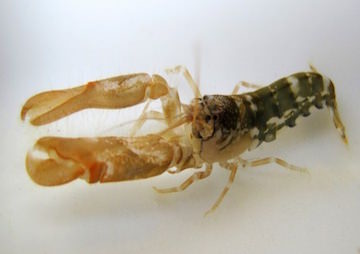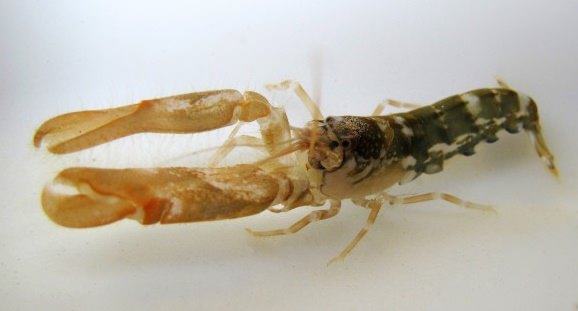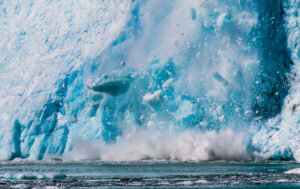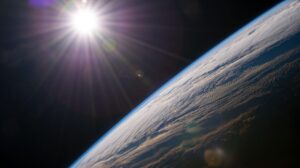Shrimp Sound Ocean Acidity Alarm
The effect of the sea absorbing increased carbon dioxide in the air has damaging consequences for the noisy snapping shrimp and marine life in coastal rock pools.
By Tim Radford / Climate News Network

The snapping shrimp is the noisiest marine creature in coastal ecosystems. (Tullio Ross/University of Adelaide)
This piece first appeared at Climate News Network.
LONDON — The slow change in water chemistry as more and more atmospheric carbon dioxide dissolves in the sea and causes acidification could make the oceans much less noisy and slow the growth of life at the sea’s margins.
In one study, Australian scientists warn that as the acidity levels grow, the snapping shrimp may grow ever quieter. And in another study, Californian scientists have tested the water chemistry in coastal rock pools and discovered that they become most corrosive at night.
The snapping shrimp is the loudest invertebrate in the ocean. It forms bubbles in its snapping claw and uses this noise-making tool to warn off predators. And it can generate up to 210 decibels of noise, with important consequences for other creatures in coastal ecosystems.
Cracking sounds
“Coastal reefs are far from being quiet environments — they are filled with loud cracking sounds,” says Tullio Rossi, a marine acidification specialist at the University of Adelaide’s School of Biological sciences. “Shrimp choruses can be heard kilometres offshore and are important because they aid the navigation of baby fish to their homes. But ocean acidification is jeopardising this process.”
He and colleagues report in the Proceedings of the Royal Society B that they tested the shrimps under laboratory conditions of acidity predicted for the end of the century, and they found that both the frequency and volume of the snapping noises diminished.
The researchers also made field recordings at carbon dioxide-rich submarine volcanic vents, and observed the same pattern. They believe that the change of ocean pH levels affects behaviour, rather than impairing physiology.
“If human carbon emissions continue unabated, the resulting ocean acidification will turn our currently lively, noisy reefs into relatively silent habitats”
“This outcome is quite disturbing,” says Ivan Nagelkirken, a marine ecologist at the University of Adelaide. “Sound is one of the most reliable directional cues in the ocean because it can carry up to thousands of kilometres with little change, whereas visual cues and scents are affected by light, water clarity and turbulence.
“If human carbon emissions continue unabated, the resulting ocean acidification will turn our currently lively, noisy reefs into relatively silent habitats. And given the important role of natural sounds for animals in marine ecosystems, that’s not good news for the health of our oceans.”
Researchers have been concerned at the impact of acidification for years. They have established a threat to coral reefs and shellfish larvae, to worms at the water’s edge, and to the behaviour of fish at depth. And there is increasing evidence that conditions will get progressively worse.
Growth rates
Californian coastline expert Lester Kwiatkowski, of the Carnegie Institution for Science’s Department of Global Ecology, and colleagues observed the impact of increasing acidity in a series of rock pools. They found that growth rates and shell formation were not greatly affected in the daytime.
However, they conclude in Nature Scientific Reports that the natural respiration of carbon dioxide from plants and animals at low tide made the pool water corrosive at night.
“Even in today’s temperate coastal oceans, calcifying species, such as mussels and coralline algae, can dissolve during the night due to the more-acidic conditions caused by community respiration,” says Dr Kwiatkowski.
His Carnegie colleague and co-author, Professor Ken Caldeira, says:: “If what we see happening along California’s coast today is indicative of what will continue in the coming decades, by the year 2050 there will likely be twice as much night-time dissolution as there is today.
“Nobody really knows how our coastal ecosystems will respond to these corrosive waters, but it certainly won’t be well.”
Tim Radford, a founding editor of Climate News Network, worked for The Guardian for 32 years, for most of that time as science editor. He has been covering climate change since 1988.
Your support is crucial…With an uncertain future and a new administration casting doubt on press freedoms, the danger is clear: The truth is at risk.
Now is the time to give. Your tax-deductible support allows us to dig deeper, delivering fearless investigative reporting and analysis that exposes what’s really happening — without compromise.
Stand with our courageous journalists. Donate today to protect a free press, uphold democracy and unearth untold stories.









You need to be a supporter to comment.
There are currently no responses to this article.
Be the first to respond.